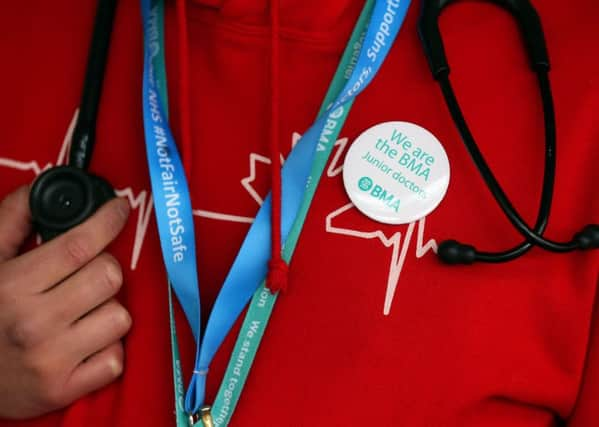Melody Redman: As a junior doctor, why it is my duty to go on strike


Those numbers are bad. They mean I run.
They mean we get a team ready for emergency treatment.
They mean this patient is really sick and we need to act quickly.
If we don’t respond now, this patient’s heart will stop beating.
Lub-dub, lub-dub, lub-dub.
Advertisement
Hide AdAdvertisement
Hide AdStill fighting to keep going, but it sounds fast. I hear it and I know it cannot be sustained.
Who is this patient?
This patient is our NHS.
I got home today to a message from Monika.
Monika is a junior doctor colleague who I have really admired for quite some time, telling me she was resigning from her post.
She is a junior doctor in paediatrics, a specialty that I’m about to enter.
She had one exam left.
She said: “I’m not happy, and I really resent being there. It feels unsafe and it feels wrong… I’ll be sure to CC Jeremy Hunt in my resignation letter… I felt so burdened with it and now I feel free.”
My heart sinks.
Advertisement
Hide AdAdvertisement
Hide AdWhile this was perhaps the right decision for her, it is a loss to the NHS.
Ayesha, another junior doctor, said to me: “I was not brave enough to leave, I stayed and got burnt out. With hindsight that was eminently preventable…”
Their blood pressure is dropping, doctor.
A third junior doctor, Julie, told me this weekend: “My husband wasn’t well this week and was admitted to hospital… and [the rota team] said: ‘You can’t leave because there’s no one to cover your ward.’
“I love working in hospital medicine but I won’t do it if it means not being able to be there for my family.”
Advertisement
Hide AdAdvertisement
Hide AdRob, a junior doctor, who is a registrar in an emergency specialty dealing with really sick patients, worked 80 hours over six days in work this week. One of the shifts was 16 hours long because he had to stay late to look after a poorly patient.
He was exhausted. He said: “I’m not blaming anyone, the system is at breaking point and we’re all stuck desperately trying to keep it going.”
Blip… blip… blip.
I look to the monitor and I see the patient’s vital signs are getting worse.
The rota gaps are painful. The job is emotionally and physically tiring. We want to do our best, but there aren’t enough of us.
Advertisement
Hide AdAdvertisement
Hide AdThe demand on our healthcare system is increasing, but we’re not matching that with our resources.
On Thursday night, I came home from work and I cried.
I cried because I found out one of my patients had passed away.
The following three days were 12 and a half hour shifts.
These shifts made this weekend my third working weekend in the last six weeks.
I had an exam in the last week as well.
The exam cost me lots of money, time and energy, as I needed to take annual leave off to revise prior to sitting it.
I also had an interview two weeks ago.
Advertisement
Hide AdAdvertisement
Hide AdI am tired. I wanted to see my grandma who’s not been doing so well lately.
I just wanted to go see my friend’s twin babies who are growing up too fast for me to see them often enough. Every person is unique, but this patient passing away was a particularly sad one.
It makes you want your loved ones to know they’re valued, but to be able to care for everyone else’s loved ones in our strained NHS, you often lack the time to fully care for your own.
Lub … dub… lub… (silence)… their heart has stopped beating.
Is the NHS dying, or can we save it?
As doctors, we can’t “save” everyone, but we like to make people as well as they can be for as long as they can be. That’s our job, our life and our motivation.
Advertisement
Hide AdAdvertisement
Hide AdWhen someone is really poorly, we may have to make a big decision.
We decide whether to escalate their care, which normally means taking them to the intensive care unit for special medications and resources, or, if treatment is futile and will instead cause unnecessary pain and further bad effects, it may mean doing all we can to make them comfortable, giving them medications to take away the pain and discomfort, and letting the illness take its course.
I believe we can save the NHS. But we need to act now. Before the very heart of our NHS stops beating.
After all, we’re only human.
Melody Redman is a junior doctor in North Yorkshire. She will be undertaking industrial action with junior doctor BMA members across England today. To find out more, see: http://oneprofession.bma.org.uk/. Colleagues’ names have been changed.